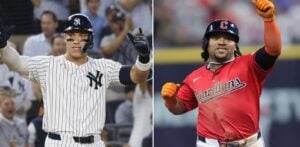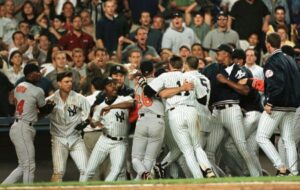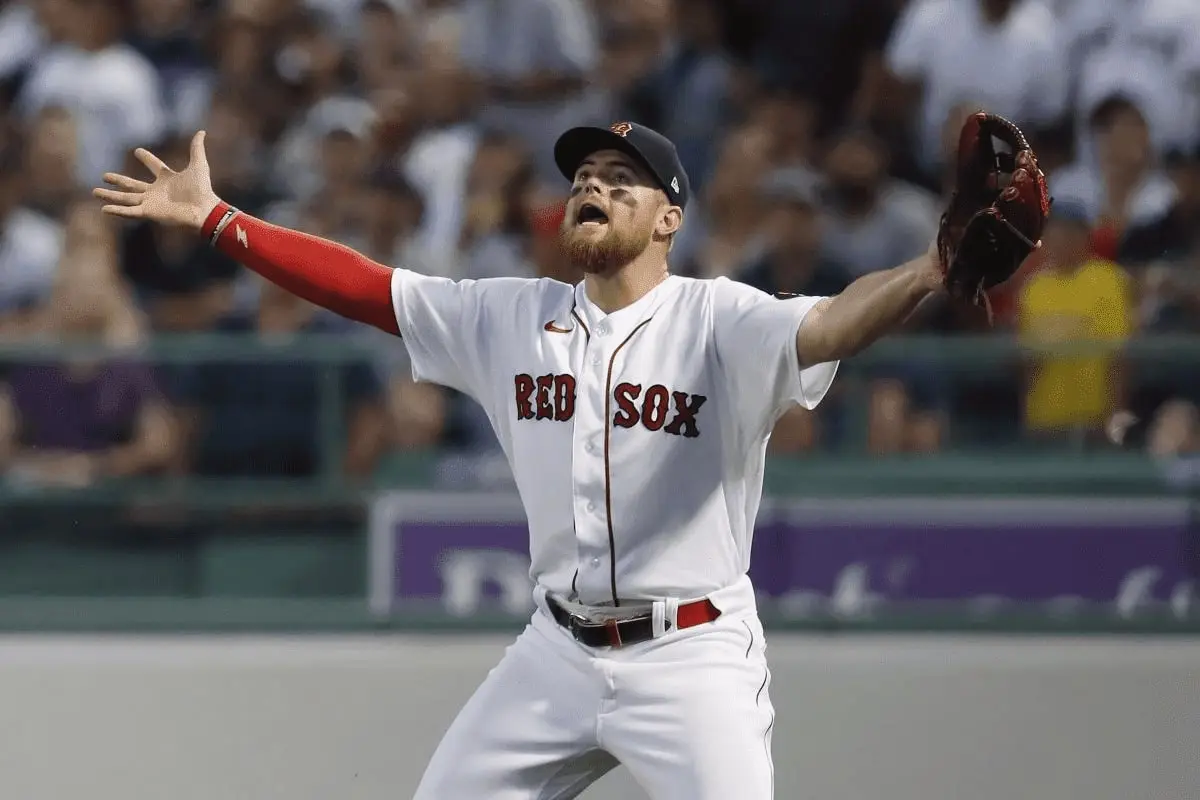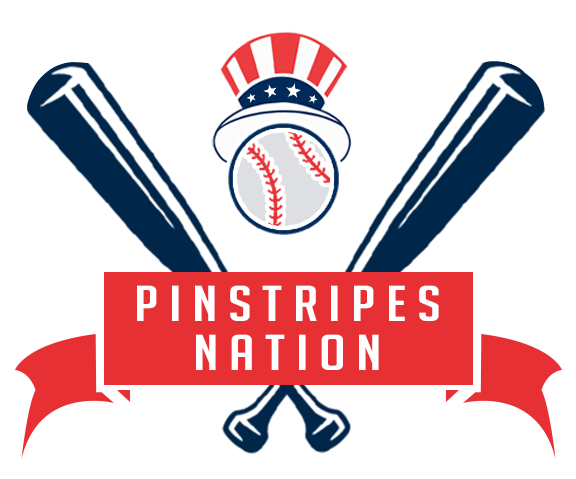The 1999 Yankees: A dynasty that learned to defy the odds, committed to win
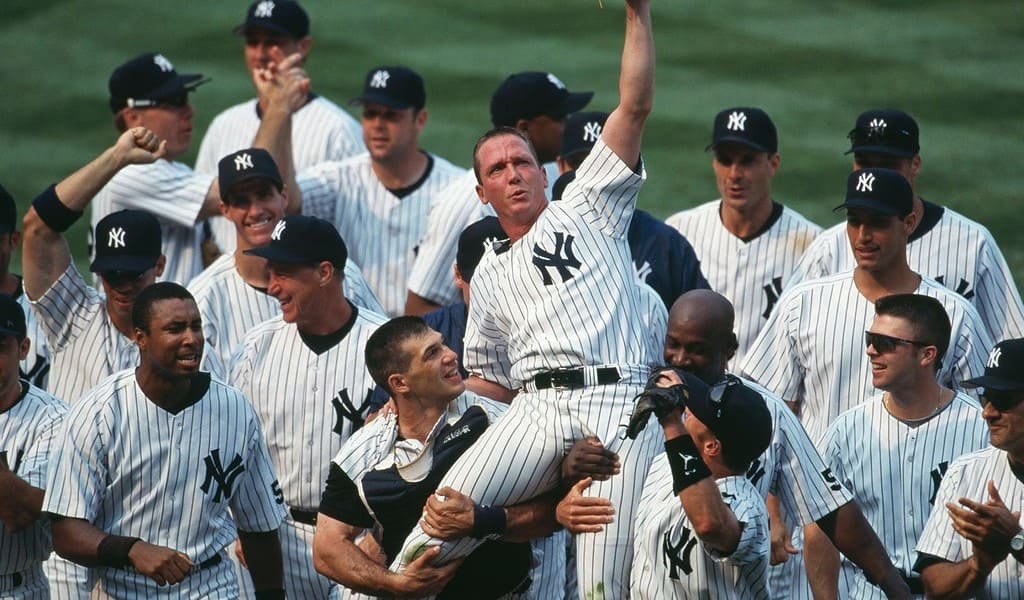
John Allen
More Stories By John Allen
- Mother’s Day: How Anthony Volpe’s mom molded him into a Yankee phenom
- Yankees’ Gleyber Torres projected to sign with NL West contender
- Yankees keeping tabs on Santander while Soto decision looms, says insider
- Hal Steinbrenner calls Juan Soto talks ‘good’ as Yankees weigh free agency moves
- Dave Sims excited to fill big shoes in Yankees booth, Sterling mulls weekly show
Table of Contents
Every championship squad has a unique backstory. For the 1999 Yankees, the story was as much about the teams that came before and after as it was about them. After a successful 1998, the Yankees were again up on the podium with the World Series trophy on October 27, 1999. However, the journey was not easy. There was a tedious process of team building behind their successful campaign.
In 2000, the Yankees barely made it into the playoffs before making another run and winning their third straight title in the most memorable way possible by beating their crosstown rivals, the Mets, in the Subway Series. This was a game that New York fans had been dying to see for 40 years.
Yet all the 1999 Yankees did was slog their way to a 98-win season and their third world title in four years.
“Obviously, 1998 was such a magical year, and 2000 had the Mets-Yankees thing,” says Paul O’Neill. “But you can never make World Series championships small because they’re so hard to win. To be able to repeat is difficult. You’re still trying to hold on to that feeling of being a world champion. When you look back at 1999 and you know how hard it is to repeat with basically the same people, that’s the story to me.”
The 1999 Yankees kept the 1998 core intact
The 1998 team won 114 games, which was an American League record at the time. They won 11 more games in October, giving them a total of 125 wins, a World Series title, and a good case for being the best team in baseball history.
After the historic 1998 season, free agents David Cone, Scott Brosius (who won the Most Valuable Player award in the 1998 World Series), and Bernie Williams all signed new contracts and stayed on the team. Williams, a lifelong Yankee who was an important part of the 1998 team, almost switched to the Boston Red Sox that winter. Had he been to Fenway Park, it would have changed the history of both teams.
Albert Belle, a big-hitting free agent, was being courted by the Yankees, while Williams seemed to be getting close to a deal with the rival Red Sox. Yankees Hall of Fame manager Joe Torre even had a private dinner with him in Arizona to discuss a deal. However, Belle dumped the Yankees and signed with the Baltimore Orioles. This forced the Yankees’ top brass to focus on keeping Williams, giving George Steinbrenner and the Yankees a .342 average, a .977 OPS, 25 home runs, and 115 RBI in the first year of his new contract.
Thus, the 1998 Yankees group was back together and had a chance to defend its title the right way.
The new additions
As the Yankees got ready for Spring Training at Legends Field, it seemed like everything was in place for Torre’s team to try for its third championship in four years. Pitchers and catchers had just finished unpacking when second-year general manager Brian Cashman pulled off a blockbuster trade. He sent David Wells, Graeme Lloyd, and Homer Bush to the Blue Jays in exchange for Roger Clemens, who had won the American League Cy Young Award each of the last two seasons while playing for Toronto.
“Mr. Steinbrenner always mixed it up; we win 114 games, 125 total, and the next thing you know, he makes a trade to get Roger Clemens,” reliever Jeff Nelson says. “Once everybody signed back, you figured, ‘We’re going to be the favorites to win the World Series again.’ The next thing you know, we’re getting Clemens in the first week of Spring Training.”
Torre’s cancer jolt to Yankees
That spring, Torre’s message to his team was simple: last year was great, but it doesn’t mean anything once the first pitch is thrown.
“Spring Training is so important because you’re sending a message that you’re still going to do all the fundamental, boring things that everybody knows how to do,” Torre says. “I felt it was important to do that because you don’t want to send a message that we don’t need to do those things.”
But the spring would be anything but normal or boring. Torre got the terrible news that he had prostate cancer less than four weeks before the Yankees were set to start the season in Oakland. The manager had surgery soon after he found out on March 10 that he had cancer. He would be out of work for a little more than two months. Don Zimmer, who was a good friend of Torre’s and a trusted bench coach, ran the team while Torre was away.
“Zim was not your typical bench coach,” O’Neill says. “He was a big, big part of that team. We were left in good hands.”
Even without Torre, the Yankees got off to a good start, going 7-1 early on. As strong as the 1998 team was, the 1999 team came out of the gate ready to win.
“Our manager was gone, so we obviously couldn’t let down,” Nelson says. “We didn’t want to go in a direction where when he came back, we’d have to flip a switch and turn it around. We were playing for something; we were playing for Joe and playing for Zim at the same time.”
But the Red Sox weren’t making things easy for the Yankees. On May 15, the Yankees and Red Sox were tied for first place in the AL East. Three days later, Torre decided he was ready to go back to the dugout. When he showed up at Fenway Park for the first game of a series against the Red Sox, he surprised his team. Zimmer told Torre that he should bring the lineup card to home plate before the game. Torre got a two-minute standing ovation from the Boston crowd, and “Welcome back” was written on the Fenway scoreboard.
“That was a very powerful evening,” Torre says. “Especially where I was emotionally at that point in time, it meant a lot.”
During Torre’s first three weeks back at the helm, the Yankees went 11-9, and even though they were always in second place, they never fell more than 212 games behind first. On June 9, the Yankees beat the Phillies 11–5, which put them ahead of the Red Sox for the first time since Torre came back. This seemed to bring order back to the Yankee’s Universe.
They wouldn’t lose the first place for the rest of the season.
“We came to the ballpark every day not thinking we had a chance to win, but expecting to win,” says reliever Mike Stanton. “When we didn’t, it upset us.”
The unassailable lead and Cone’s perfect day
At the All-Star break, the Yankees had a four-game lead, which was the same as their biggest lead since Torre came back. However, they knew that Boston wasn’t going anywhere soon. Everyone in the league had a bull’s eye on the Yankees, so Torre told his team that every night, whether they were playing the Red Sox or the Devil Rays, they had to bring their best game.
“To repeat is harder than doing it the first year because so many things have to go right for a team to win,” Torre says. “After you win, the next year, everybody is out to get you. Every city you go to, for those teams and their fans, it would make their month or their year if they had a big series against the Yankees. You realize when you’re part of a team like this that it doesn’t matter what city you go to, you’d better show up or teams will try to embarrass you.”
As the Yankees came back from the All-Star break, everyone was looking forward to July 18, when Yogi Berra would be honored before the game against Montreal. David Cone pitched a perfect game against the Expos, making history in a different way. This was the Yankees’ second perfect game in 15 months after Wells did it in May 1998.
The Yankees used Cone’s historic day as a sort of springboard, and they went on a 17-7 run to pull away from the Red Sox. In September, Boston was behind by 7 1/2 games, and even though the Sox closed the gap to 3 games in the last few weeks of the season, the Bombers won their second straight division title. Derek Jeter, a shortstop, had a great season. He led the Major Leagues with 219 hits and set career highs in batting average (.349), home runs (24), RBI (102), runs (134), and triples (9).
The Yankees would have a chance to defend their title, which they didn’t do after winning the World Series in 1996.
“Winning in ’96 and then again in ’98, we always thought, ‘Just get to the postseason,’” Tino Martinez says. “We knew how to win. We knew if we got to October, we would have a good shot at it.”
Torre had more than a chance to win a third ring in the last weeks of the season. During that time, the manager realized that his cancer treatment hadn’t made him less competitive, which was something he had wondered about during the four months before. “Cancer is something you always have with you. “I was interested in how important what I did for a living was compared to living,” Torre says. “What was going on here?” On September 14, a game in Toronto put to rest any worries that Torre was just going through the motions.
“We had bases loaded and we were behind in the game, and I was willing to make any trade if Bernie got a hit,” Torre says. “He hit a home run. I realized at that point I was back. You were curious if you’d still have the same hunger to do what I had done and what we had done together. Once that happened, it was a good sign for me.”
The Yankees beat the Texas Rangers quickly in the AL Division Series for the second year in a row and the third time in four years. This time, though, their opponent in the AL Championship Series was different.
Yankees vs. Red Sox battle
The Yankees and Red Sox had previously played one-game playoffs to determine the AL East, but they had never met in a postseason series with a trip to the World Series on the line. The rivalry had taken a back seat for many years, with the Orioles being the Yankees’ primary adversary during Torre’s first three years in charge, but after jockeying for a place in the division all season, the Yankees and Red Sox would be playing in a cauldron. This series would bring the rivalry between the teams back to a boil.
“You want to talk about pressure?” Martinez says. “We had a lot of big-pressure moments during that run, but having to play the Red Sox in the ALCS was a ton of pressure, from The Boss all the way on down. We could not lose to them in that ALCS.”
The Yankees were a well-oiled machine, with a consistent lineup that had seven players with at least 17 home runs that season, a rotation stocked with four top-tier starters (Clemens, Cone, Orlando Hernández, and Andy Pettitte), and a deep bullpen anchored by Mariana Rivera.
“I liked the feel of the team,” Torre says. “We had talked many times about ability being equal, but the only thing that’s going to get you through is character and the willingness to sacrifice. It was a very unselfish team. Nobody needed to be the hero, it was just a matter of winning the game — however that would happen.”
The Yankees won the first two games of the best-of-seven series at Yankee Stadium by one run each, but in Game 3, Pedro Martnez shut them out by striking out 12 batters over seven scoreless innings. Game 4 was close until the ninth inning when Ricky Ledee’s grand slam capped an inning in which the Yankees scored six runs and won the game. With a convincing win in Game 5 at Fenway, the Yankees clinched the AL pennant. They will now go to the World Series to try to win it again.
“It’s like playing the Mets; you had to win,” Torre says. “It didn’t matter who was the better team, you just had to win. We beat them pretty good. It was significant.”
The World Series win beating all odds
In 1996, when the Yankees played the Braves in the World Series, they lost the first two games. But in their rematch in the Fall Classic, the Yankees got off to a quick start and beat the Braves. Hernandez and Cone played 14 innings of one-run baseball, sending the series back to the Bronx with the Yankees halfway to another championship.
“We beat them in the first two games in their ballpark,” Torre says. “I kind of liked starting on the road because the home team has pressure to win. I thought if we could win the first game, we’d really be in great shape.”
Just as Torre’s illness made the beginning of the 1999 season hard, there were also a lot of problems at the end of the year. Brosius’s dad died in the middle of September, and Luis Sojo’s dad died the day before the World Series started. Before Game 4, O’Neill got a call that his father had died. This was the third time in just six weeks that a Yankees player had to deal with such a sad loss.
“It was a strange year,” O’Neill says. “Joe Torre’s greatest strength was that he understood people and how things in life affected you as a player. If other things were going on in your life, you might not be the same player on the field at times. Joe was very good at recognizing that and understanding it.”
In Game 4, when the Yankees finished off the sweep, O’Neill was in right field. Clemens beat John Smoltz in the deciding game, and Rivera was named Most Valuable Player of the World Series after the closer finished his perfect postseason with a win and two saves.
“He had ice water in his veins,” Stanton says. “There was no difference for him pitching in a Spring Training game in March or a World Series game in late October.”
So, the Yankees won the World Series again, making it the first time the team has won back-to-back titles since 1977–78. In 2000, Torre’s team won again by beating the Mets in the ultimate Subway Series, a game that was more stressful than even the ALCS game with the Red Sox the year before.
“It gets lost in the shuffle a little bit,” Nelson says of the ’99 title. “You win 125 games in ’98 and beat the Mets in 2000, it feels like a ho-hum year. But at the same time, it was Roger’s first year winning a World Series — and it was our first time winning two in a row.”
Even though the 1999 season wasn’t as memorable as the championship years that came before and after it, any year that ends with a parade is one to remember.
“It was going to be hard to top 1998,” Martinez says. “But when you see 3 million people lining the Canyon of Heroes, you know it wasn’t lost in the shuffle. We didn’t have the record of the ’98 team or the Mets Subway Series of 2000, but we beat Greg Maddux, John Smoltz, and Tom Glavine. That’s something.”
What do you think? Leave your comment below.
- Categories: 1999 yankees, andy pettitte, bernie williams, David Cone, Mariano Rivera
- Tags: 1999 yankees, andy pettitte, bernie williams, David Cone, Mariano Rivera

 Follow Us
Follow Us
